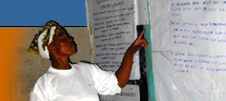|
By Ingrid
Olausson, Consultant and Future Search Network member
Stockholm, Sweden, 1997: The
first Swedish future search conference was held Nov. 5-7, 1997, in Kalmar,
Sweden. Fifty participants looked into the future of mass media: reporters,
editors, managers from all kinds of media; researchers and students; and also
a group of readers, viewers, and listeners.
The future search was managed by Ingrid Olausson and Hans Isacsson,
who got to know each other via the Search Listserv.
(For those of you who read Swedish, there is a full report on the
Internet and a discussion forum for ongoing debate and reports on the suggested
projects at www.fo.hik.se).
| We did the mind map on the white board, which worked very well.
It was easy to wipe off trends when people changed their minds during the
discussion. But it was really hard work to take away the dots afterward.
We introduced the scenario work with a guided visualization on the media landscape
in the year 2010. This was very powerful.
We worked with large post-it notes for the common
ground values. Each table had to agree on about three to five values.
People were very tired at this stage, so we skipped the discussions
at merged tables. The groups could put the notes directly on the wall.
In this way the energy that was left could go directly into sorting
the common ground agreements on the wall. It was easy to move the
notes around, but they didn't stick well to the paper we had put up
on the wall. They kept falling down all the time, and we had to use
mounting putty to get them to stay there overnight. We also used post-it
notes (smaller ones) for the prouds and sorries. The flip charts were
divided vertically and it was easy to group the prouds on one side
and the sorries on the other. |
"Journalists
are very talkative! - and we had some hard work during plenary
discussions." |
|
At the end, six of the project groups reported out to the conference
participants, as follows:
The Web site: This
was to be started immediately, and the first thing to be presented on the
Web is the conference report that one of the journalists was going to write.
Future organizations: This
group was formed to investigate the possibilities for better organizations
for media companies. They will start with a documentation of what already
is done to introduce new ways to work in editorial offices, and then compare
this with what has been done in other business areas. Their goal is to
spread knowledge about what can be done to get a deeper and broader journalism.
Rotation of work assignments: The
goal is to encourage job swap.
Journalism in schools: The
group wants to create models for how to work with journalism in schools.
Passion: Everyone
who knows anything about how to keep the passion during your journalistic
career is encouraged to contribute to the Web site.
The mission: Journalists
have to change perspectives and look at the environment as co-producers,
and share their insights with others.
It was really fun to do this future search with people from my
own profession. But we were pretty exhausted afterward. Journalists are
very talkative!--and we had some hard work during plenary discussions.
top
 back back
|


